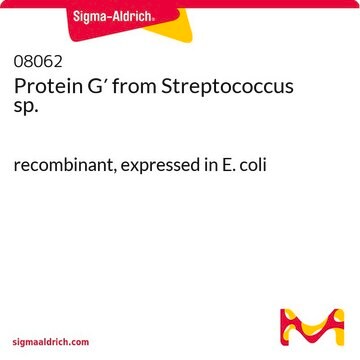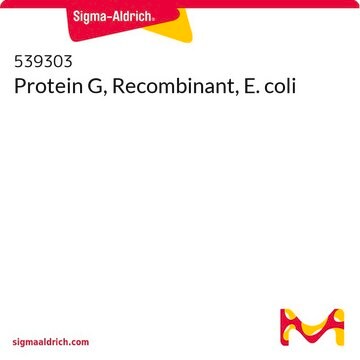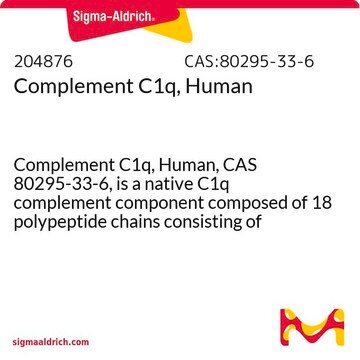Description générale
Protein L is an immunoglobulin light chain-binding protein. It is expressed by a few anaerobic bacterial species, such as Peptostreptococcus magnus.
Protein L protein binds immunoglobulin (Ig) light chains in a wide range of species including human, mouse, rat, pig, hamster, and chicken, but has low affinity for Igs from guinea pig, and rabbit. This bacterial protein interacts with Ig light chains without blocking the antigen binding site of the Igs . Thus, protein L can be used for the detection of IgG, IgM, IgA, IgE and IgD containing κ light chains. It may also be used to detect Fab and scFv fragments containing κ light chains. Protein L does not bind to bovine, sheep or goat Igs. Hence, when bound to a solid support (sepharose) , protein L may be used to directly purify monoclonal antibodies from media supplemented with BSA or FCS, and also to directly purify human or mouse antibodies from goat, bovine or sheep proteins. rProtein L is a recombinant form of the native protein and contains two Ig binding protein L fragments.
Application
Protein L from Peptostreptococcus magnus is suitable for use in indirect ELISA (1:100,000). This product may also be used for immunohistochemistry in rat kidney sections .
Actions biochimiques/physiologiques
Protein L from Peptostreptococcus magnus binds immunoglobulins (Ig) primarily through kappa light chain interactions without interfering with the antigen binding sites of Ig′s. This means that Protein L binds to a wider range of Ig classes and subclasses from a variety of species than any other commercially available Ig binding protein. It contains four Ig binding domains (B-domains). It may be used for the purification of IgG, IgM, IgA, IgE and IgD containing κ light chains and for the purification of Fab and scFv fragments containing κ light chains. It may be conjugated to a solid support for affinity purification or conjugated to marker molecules for use in detection. Protein L does not bind to bovine, sheep or goat immunoglobulins. For this reason it may be used for the purification of monoclonal antibodies from media supplemented with bovine serum albumin or fetal calf serum. It can also be used to purify human or mouse antibodies from goat, bovine or sheep proteins. A comprehensive list of binding properties is found in the product data sheet.
Reconstitution
Reconstitute with 5 mL PBS, pH 7.4 containing 15 mM sodium azide to yield a 1 mg/ml solution of Protein L. Other buffers may also be used for reconstitution. After reconstitution, the solution containing sodium azide may be stored at 2-8 °C for a maximum of 1 month.
Clause de non-responsabilité
Unless otherwise stated in our catalog or other company documentation accompanying the product(s), our products are intended for research use only and are not to be used for any other purpose, which includes but is not limited to, unauthorized commercial uses, in vitro diagnostic uses, ex vivo or in vivo therapeutic uses or any type of consumption or application to humans or animals.












